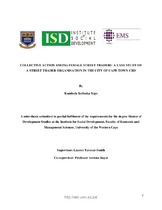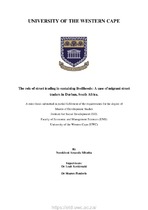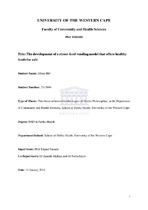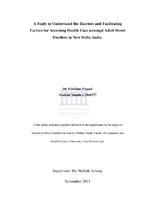Collective action among female street traders: A case study of a street trader organisation in the City of Cape Town CBD
| dc.contributor.advisor | Tavener-Smith, Lauren | |
| dc.contributor.author | Xego, Kumbula Koliseka | |
| dc.date.accessioned | 2022-03-09T09:06:01Z | |
| dc.date.issued | 2021 | |
| dc.identifier.uri | http://hdl.handle.net/11394/8856 | |
| dc.description | Magister Artium (Development Studies) - MA(DVS) | en_US |
| dc.description.abstract | Street trading is a highly contested activity in South Africa because of the different interests held by the government, other stakeholders and street traders. The contradictory nature of the relationship between government and street traders has led to exclusionary policies and practices put in place by the government to regulate street trading. These exclusionary practices have negative effects on the livelihoods of street traders. Female traders are more vulnerable and at greater risk than their male counterparts. Organised labour movements have largely focused on formal sector workers, leaving the rights of informal workers largely unregulated. In recent years there has been an emergence of informal sector organisations seeking to protect the interests of street traders and influence informal trading policy. Although seldom researched, a number of informal sector organisations have emerged in South African cities. | en_US |
| dc.language.iso | en | en_US |
| dc.publisher | University of Western Cape | en_US |
| dc.subject | Street trading | en_US |
| dc.subject | Female street traders | en_US |
| dc.subject | City of Cape Town | en_US |
| dc.subject | Grand Parade | en_US |
| dc.subject | Street trader organisations | en_US |
| dc.title | Collective action among female street traders: A case study of a street trader organisation in the City of Cape Town CBD | en_US |
| dc.rights.holder | University of Western Cape | en_US |
| dc.description.embargo | 2023 |




